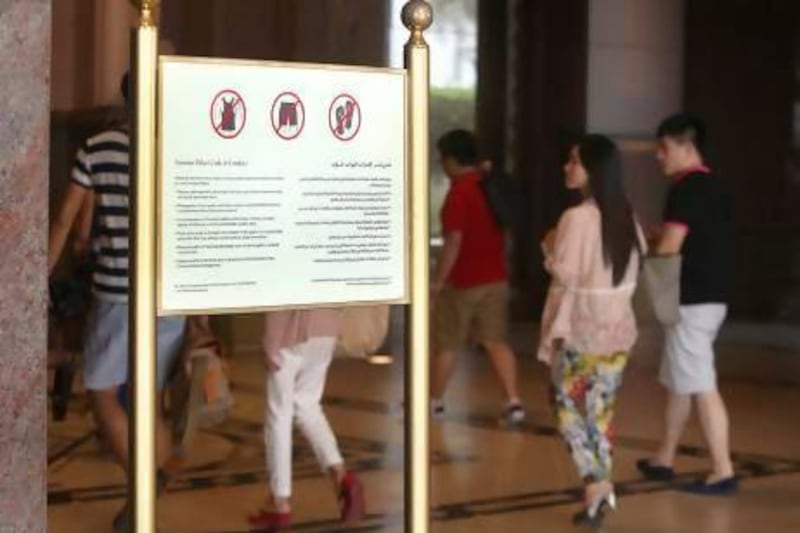ABU DHABI // Emirates Palace hotel is urging guests to dress conservatively after people wearing inappropriate clothing were turned away from its iftar tent.
The luxury hotel is warning guests to be mindful of UAE traditions and culture during the holy month.
Some guests wearing immodest dress to its Ramadan pavilion have been given a shawl or abaya or been asked to leave and return when more appropriately dressed.
"We have turned away a few guests," said Alex Schneider, the hotel's manager. "During the holy month it is recommended to dress in a modest and unrevealing style, therefore we are obliged to ensure that our guests follow these important guidelines simply to respect the feelings of the majority of our diners."
Tourists and expatriates are encouraged to wear attire that is respectful of the holy month.
Clothing that is tight-fitting or too short, such as shorts and miniskirts, are among the list of banned garments, said Mr Schneider.
"To maintain the luxury environment of the Emirates Palace, we require our visitors and guests to adhere to a dress code," he said.
"This is a policy we maintain year-round.
"We ask that guests staying with us, or visiting one of our dining outlets, dress smartly and modestly, which means that shorts, miniskirts, sleeveless shirts, sportswear and beachwear, including open sandals or flip flops, are not appropriate."
The rules apply to women and men visiting the hotel.
"In line with the direction from the Abu Dhabi Government on modest dress during Ramadan, we provide shawls and abayas for guests who need to cover immodest clothing to enjoy our Ramadan pavilion and, in some cases, guests who are unwilling to comply with the dress code may not have the opportunity to enter," said Mr Schneider.
The dress code is especially important during Ramadan, he said, and the attitude towards dress is about respecting traditional Islamic culture.
"The month of Ramadan celebrates the religion, the tradition of fasting and a modest and humble lifestyle," said Mr Schneider.
"It defines a very important period of the Islamic calendar and, therefore, we feel at Emirates Palace that following these guidelines is a very important way to show the respect for the religion and the culture of the UAE."
Emiratis dress conservatively, Mr Schneider said, so the hotel expects expatriates to dress according to local tradition and culture.
The dress code in place is enforced throughout the hotel and not just in the pavilion, which, spread over 2,400 square metres, is the largest purpose-built Ramadan tent in Abu Dhabi, seating 730 guests.
"Emirates Palace, being the icon of Emirati hospitality, has a genuine interest to support the traditions of Ramadan," Mr Schneider said.
"This year's Ramadan pavilion at Emirates Palace has been recognised by the local and regional clientele as one of the most important venues within the UAE to meet to break the fast over iftar and to enjoy suhoor during the evening hours.
"Since the dress code is not defined by us but much more through religion and tradition, we merely followed the existing guidelines.
"The overall feedback on this service showed a great appreciation in almost all cases."
The Tourism and Cultural Authority warned expatriates this month to cover their shoulders and knees during Ramadan to avoid unwanted attention.
[ jbell@thenational.ae ]






